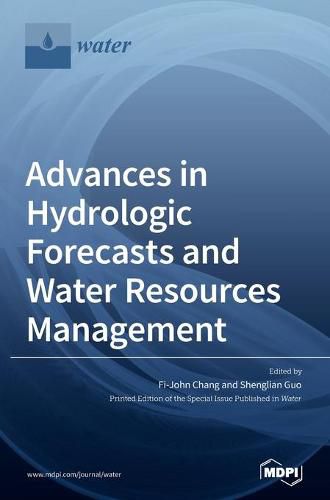Readings Newsletter
Become a Readings Member to make your shopping experience even easier.
Sign in or sign up for free!
You’re not far away from qualifying for FREE standard shipping within Australia
You’ve qualified for FREE standard shipping within Australia
The cart is loading…






This title is printed to order. This book may have been self-published. If so, we cannot guarantee the quality of the content. In the main most books will have gone through the editing process however some may not. We therefore suggest that you be aware of this before ordering this book. If in doubt check either the author or publisher’s details as we are unable to accept any returns unless they are faulty. Please contact us if you have any questions.
The impacts of climate change on water resource management, as well as increasingly severe natural disasters over the last decades, have caught global attention. Reliable and accurate hydrological forecasts are essential for efficient water resource management and the mitigation of natural disasters. While the notorious nonlinear hydrological processes make accurate forecasts a very challenging task, it requires advanced techniques to build accurate forecast models and reliable management systems. One of the newest techniques for modeling complex systems is artificial intelligence (AI). AI can replicate the way humans learn and has great capability to efficiently extract crucial information from large amounts of data to solve complex problems. The fourteen research papers published in this Special Issue contribute significantly to the uncertainty assessment of operational hydrologic forecasting under changing environmental conditions and the promotion of water resources management by using the latest advanced techniques, such as AI techniques. The fourteen contributions across four major research areas: (1) machine learning approaches to hydrologic forecasting; (2) uncertainty analysis and assessment on hydrological modeling under changing environments; (3) AI techniques for optimizing multi-objective reservoir operation; (4) adaption strategies of extreme hydrological events for hazard mitigation. The papers published in this issue will not only advance water sciences but also help policymakers to achieve more sustainable and effective water resource management.
$9.00 standard shipping within Australia
FREE standard shipping within Australia for orders over $100.00
Express & International shipping calculated at checkout
This title is printed to order. This book may have been self-published. If so, we cannot guarantee the quality of the content. In the main most books will have gone through the editing process however some may not. We therefore suggest that you be aware of this before ordering this book. If in doubt check either the author or publisher’s details as we are unable to accept any returns unless they are faulty. Please contact us if you have any questions.
The impacts of climate change on water resource management, as well as increasingly severe natural disasters over the last decades, have caught global attention. Reliable and accurate hydrological forecasts are essential for efficient water resource management and the mitigation of natural disasters. While the notorious nonlinear hydrological processes make accurate forecasts a very challenging task, it requires advanced techniques to build accurate forecast models and reliable management systems. One of the newest techniques for modeling complex systems is artificial intelligence (AI). AI can replicate the way humans learn and has great capability to efficiently extract crucial information from large amounts of data to solve complex problems. The fourteen research papers published in this Special Issue contribute significantly to the uncertainty assessment of operational hydrologic forecasting under changing environmental conditions and the promotion of water resources management by using the latest advanced techniques, such as AI techniques. The fourteen contributions across four major research areas: (1) machine learning approaches to hydrologic forecasting; (2) uncertainty analysis and assessment on hydrological modeling under changing environments; (3) AI techniques for optimizing multi-objective reservoir operation; (4) adaption strategies of extreme hydrological events for hazard mitigation. The papers published in this issue will not only advance water sciences but also help policymakers to achieve more sustainable and effective water resource management.